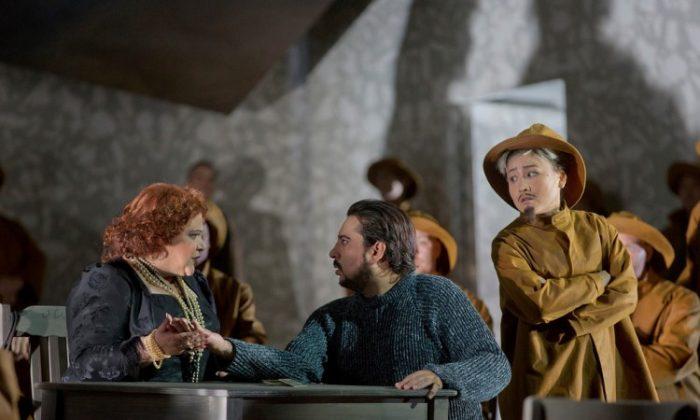NEW YORK—“Un Ballo in Maschera” (“A Masked Ball”) is Verdi’s opera about the assassination of the Swedish monarch, Gustav III, in 1792. The censors in Italy at the time the opera was first performed (1859) were sensitive about the subject of regicide and the action was changed to colonial Boston.
For the last half-century or so, most opera companies, including the Metropolitan Opera, have restored the locale to Sweden and that is true of the new production, directed by David Alden. However, the time frame is moved up to the early 20th century.
Verdi’s librettist Antonio Somma based his script on an actual assassination at a masked ball. Even the fortuneteller is based on a real person: a supposed clairvoyant named Ulrica, who warned King Gustav that he was in mortal danger.
However, Somma fabricated a romance between the king and Amelia, the wife of the ruler’s adviser and friend Captain Anckarström, which is the name of the actual killer. There is a group that plots to murder the king for political reasons, but Anckarström performs the crime out of pure jealousy.
The Met performance was superbly sung and, on the whole, well acted, but the production seems misguided. A copy of Merry-Joseph Blondel’s painting of “The Fall of Icarus” is prominently displayed throughout. The reference is emphasized by having Oscar (the king’s page, a trouser role for a coloratura soprano) appear with wings.
The director has said that he sees Gustavo as an “Icarus figure.” However, Icarus was trying to fly and got too close to the sun. The king, in Verdi’s opera, is trying to get too close to his friend’s wife.
Alden is also quoted as saying in the Playbill that “‘Un Ballo in Maschera’ is a famous opera … . But do people know what this opera really is … .” He is correct in his analysis of the music, a brilliant mixture of light and dark, but it’s rather presumptuous to say that audiences don’t understand the opera. We read every day about men in power chasing after the wives of other men.
Coincidentally, Maureen Dowd in The New York Times referred to General Petraeus as an Icarus figure but she was referring to his pressuring President Obama to conduct the surge in Afghanistan.
Despite my reservations about the production, there is no question that the cast is first-rate. As Gustavo, tenor Marcelo Álvarez sounded a bit uncomfortable in his first act aria, “Di tu, se fedele,” but he was superb in his duet with Amelia (“O qual soave brivido”) and his last act aria, “Ma se m'e forza perderti.”
In the role of Amelia, soprano Sondra Radvanovsky once again proved that she is an outstanding singing actress and baritone Dmitri Hvorostovsky was excellent as her jealous husband, Anckarström. That their confrontation scene would generate sparks was expected since they performed it on tour together.
Mezzo soprano Dolora Zajick (alternating with Stephanie Blythe during the run) was a powerhouse as the fortuneteller Madame Ulrica, and the coloratura Kathleen Kim was a delight in the trouser role of Oscar, the king’s page.
Conductor Fabio Luisi and the orchestra and chorus all merit praise.
“Un Ballo in Maschera” will be performed intermittently through Dec. 14 at the Metropolitan Opera House and will be shown on Dec. 8 in movie theaters in 64 countries as part of the Met’s Live in HD series.
For more information call 212-362-6000 or visit metopera.org.
Barry Bassis writes about music, theater, travel, and dining for various publications.
The Epoch Times publishes in 35 countries and in 19 languages. Subscribe to our e-newsletter.










